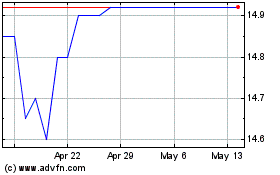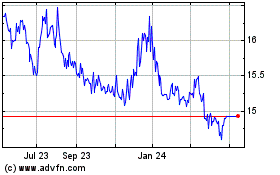By Suryatapa Bhattacharya, River Davis and Kosaku Narioka
This article is being republished as part of our daily
reproduction of WSJ.com articles that also appeared in the U.S.
print edition of The Wall Street Journal (April 18, 2019).
TOKYO -- When U.S.-based hedge-fund partner Robert Hale becomes
an Olympus Corp. director in June, it will mark a milestone in
Japan's opening up to activist investors.
Tokyo market participants say they believe it is the first time
a major Japanese company is bringing a U.S. activist onto its
board. ValueAct Capital, the San Francisco-based hedge fund where
Mr. Hale is a partner, has a 5.5% Olympus stake.
Dozens of other activist campaigns are under way in Japan. One
of Toshiba Corp.'s largest shareholders, New York-based King Street
Capital Management which holds a 5.4% stake, is seeking to replace
a majority of the company's board with its own candidates. Japanese
companies in 46 instances were subjected to activist demands in
2018, more than double the figure two years earlier, according to
data provider Activist Insight.
"Japan is entering a new era of shareholders becoming more vocal
and willing to push out underperforming managements and replace
complacent boards," says Jefferies analyst Zuhair Khan, who has
been following the Japan corporate scene for a quarter-century.
One reason is the gradual impact of changes put forward by Prime
Minister Shinzo Abe's government, which has tried to revitalize the
economy by shaking up corporate management.
A corporate-governance code, first instituted in 2015, was
strengthened last year to call for more women and non-Japanese
executives on company boards. A voluntary code for institutional
investors has compelled many to disclose how they voted at each
company and give reasons for their votes.
And American investors have refined their game from the days
when swashbuckling investors like T. Boone Pickens arrived in Tokyo
with aggressive demands that led Fortress Japan to raise its
drawbridges.
Today's American activists are more likely to quote Mr. Abe and
start off with relatively modest suggestions like adding foreigners
to the board rather than demanding a large special dividend or
corporate breakup. They choose their targets more carefully, often
picking troubled companies like Olympus and Toshiba where the
Japanese management and institutional shareholders are open to
change.
"If you are outside and you're antagonistic, we just don't find
for ValueAct that approach is effective," says Allison Bennington,
a partner at the San Francisco fund.
Japan still has a long way to go before it has diverse boards
and an abundance of well-governed companies. Only 73 of the top 500
companies listed on the Tokyo Stock Exchange have one or more
non-Japanese members on their board, according to Jefferies.
Executive search firm Spencer Stuart says 3% of board members at
Japanese companies are foreigners, compared with 8% in the U.S. and
25% in Germany.
Olympus has faced a long list of scandals in recent years, most
notably a $1.5 billion loss-hiding scheme that was exposed by
former Chief Executive Michael Woodford in 2011.
Even after the company and its former president were found
guilty of violating securities laws in 2013, the problems
continued. In January 2018, one of its in-house lawyers filed a
lawsuit against the company, saying he faced retaliation when
investigating bribery allegations in China. Olympus said it hired
outside law firms to investigate those allegations and they found
no direct evidence of bribery. It declined to comment on the
lawsuit, which is pending.
In December, an Olympus unit agreed to pay $85 million after
pleading guilty to U.S. charges that it failed to report infections
linked to one of its medical devices.
Yasuo Takeuchi, who took over as CEO on April 1, said Olympus's
run-ins with the law were "lucky" because "they forced us to look
at our company's corporate governance."
At their annual meeting in June, shareholders are set to
establish nomination, compensation and audit committees on the
board. They are aimed at better separating the board's oversight
role from management's execution tasks, like at most U.S.
companies. That was a proposal of ValueAct, which won't only get a
partner, Mr. Hale, on the board but also a former ValueAct adviser
and medical-technology executive, Jim Beasley.
"We introduced Olympus to Mr. Beasley," says Ms. Bennington of
ValueAct, adding that the company was open to Western board members
with operational experience.
Olympus gets nearly 80% of its revenue from endoscopes and other
medical technology, yet much of the century-old company's identity
among consumers is tied to its camera business.
Whether to scale back or sell that business, as some analysts
advocate after losses in recent years, is a delicate question that
ValueAct has stayed away from publicly. Olympus replaced the CEO
who had continued pursuing the camera business with Mr. Takeuchi,
who says the company is going to focus on medical devices.
As part of its transition, four new foreign executives joined
the company at its Tokyo headquarters in April, adding to a small
number who entered Olympus earlier.
Caroline West, an American lawyer with decades of experience at
health-care companies like Europe's Shire PLC and Sanofi SA, was
appointed Olympus's global chief compliance officer in 2016. When
taking the job, she says she asked management questions like "am I
just the latest fad or are companies actually making a change?"
Three years later, she thinks it is the latter. Ms. West is
introducing a global hotline for compliance and learning the
consensus-building that is needed at Japanese companies.
"Don't just snap your fingers and expect to change hundreds of
years of history," she says.
Write to Suryatapa Bhattacharya at
Suryatapa.Bhattacharya@wsj.com and Kosaku Narioka at
kosaku.narioka@wsj.com
(END) Dow Jones Newswires
April 18, 2019 02:47 ET (06:47 GMT)
Copyright (c) 2019 Dow Jones & Company, Inc.
Toshiba (CE) (USOTC:TOSYY)
Historical Stock Chart
From Apr 2024 to May 2024

Toshiba (CE) (USOTC:TOSYY)
Historical Stock Chart
From May 2023 to May 2024
